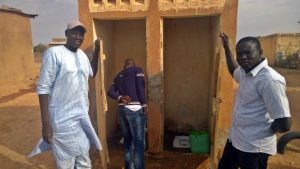This project has been completed under the direction of Peace Corps Volunteer Adam Keally. To read about the start of the project, CLICK HERE.
The project was designed to build sanitation facilities at the Master Farm and Franco-Arab school as well as return latrines at the French school to working order.
Adam reports:
Before this project began, the main educational institutions of Diagaly did not have proper sanitation facilities. The Master Farm, the French School, and the Franco-Arab school were all held back because the people they served had to walk long distances to either find a latrine or to openly defecate nearby, which endangers others at the educational facilities. Many young boys would urinate just behind the classroom. The lack of latrines also served as a barrier to those using these educational facilities, taking time away from learning, as students and teachers would leave class for extended periods to go to the bathroom.
This project has greatly improved the school’s ability to accommodate all its students and keep them in school. Girls had the most to gain from these new, clean facilities and will now face fewer boundaries.
This project included three sites, The Master Farm, The Franco-Arab School, and the French School. The Master Farm (which serves about 200 people a year) built one latrine and one washing stall in the same structure that is connected to a cement-lined basin.
The Franco-Arab School (which serves about 110 people, including teachers) built two latrines in one structure that is connected to a single cement-lined basin. They also brought a water source to the school, which included 250 m of piping, a water meter, and a water spout.
Lastly, the French School (which serves about 250 people, including teachers) replaced 9 wood plank doors, 7 Turkish toilets, redid the floors to all the stalls, and installed 15 m of piping to provide a water source to the latrines. Each site also received a Tippy Tap for hand washing.
Just as each project was finishing construction, three Peace Corps Health Volunteers traveled to Diagaly to help put on a day of WASH activities. We toured the new latrines with the students, talked about how to keep them clean, and most importantly, we talked about the importance of handwashing. The PCVs planned a day that would focus on contamination. Every stage of the day, we connected the conversation back to contamination and how bacteria/germs spread. We put on skits, we sang handwashing songs, and everyone had fun. This day provided a great foundation that I can continue to reinforce and build on through the rest of my service and work with the teachers to incorporate into their curriculum.
Each step of the way, the school directors’ and parents’ associations were proactive and excited. They went out of their way to ensure that all materials were of good quality and at a good price. I was present at all the planning meetings and negotiations with masons, but they took the lead. I am truly proud of them and the way they ensured everything was done right in a region where “good enough” is the usual mindset for any government or NGO-funded project.
The community is very excited about these new latrines and water sources. They are proud of what they accomplished and proud of their schools. It is really amazing to see how investing in schools has had a real impact on the community’s perception of the schools. There is still much to do, but every step makes a difference in leading the community to truly value education.
In a conversation with the French School director after all the latrines were finished, he voiced his frustration about all the obstacles he had to overcome just to have a normal class. He was frustrated with his government’s inability to give him what he needs, how little the community valued education compared to how he saw it, and the list went on. But then he started to talk about how relieved he was now. These latrines meant a lot to him because he understands how important they are in the overall plan of his accomplishing his goals in the community. He is sure that fewer girls will drop out purely from the greater sense of comfort and security the new latrines will provide. He sees the community now proud of how well outfitted the school is and knows this will translate into more kids going to school and staying in school.
There are many effects these new latrines will have that we can’t measure, but they go far beyond simple fixes for better health and sanitation at the school.
We extend our thanks to Adam for completing this important project.

